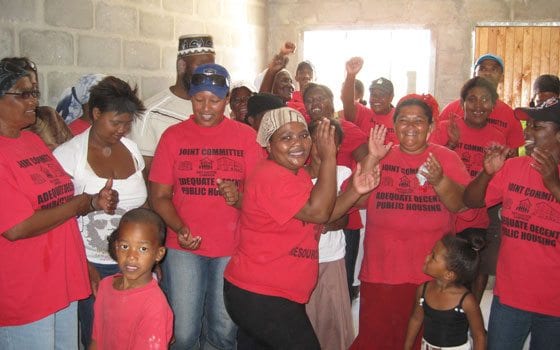
| While they’ve been given a house in Delft 7-9 by the government in Cape Town, Jolene Arendse and her family have decided that they won’t move in until all families living in makeshift homes on Symphony Way receive housing, too. (Jared Sachs photo) |
After months of often violent protests, five families belonging to the Symphony Way Anti-Eviction Campaign (AEC) received keys earlier this month to their new houses in Delft 7-9, a recently constructed residential development on the outskirts of Cape Town.
Accompanied by an entourage of 80 campaign members sporting red T-shirts bearing the slogan “No Land! No House! No Vote!”, the families found their way through a maze of nearly identical and unnumbered one- and two-story buildings.
After several false starts and wrong turns, the crowd soon found each family’s home. With wide smiles and shouts of excitement, each family christened their new home with water and a silent prayer.
“I’m glad that I received a house for the sake of my children,” said Ethel Abbels. “I’ve been on the waiting list for 17 years. I pray that everybody will get a house very soon.”
Roughly 10 months ago, these families were among thousands who illegally occupied unfinished houses belonging to a government-run N2 Gateway housing project in another part of Delft, a township on the edge of Cape Town. Alleging that they had been given permission to occupy the homes by their local councilor, these families also claimed that their actions reflected their desperate need for housing.
Like Abbels, nearly all the families that occupied the new project’s homes had been on the city of Cape Town’s waiting list for housing, many for more than a decade. While they waited, many rented makeshift shacks in the backyards of residents’ properties.
After two months of protests, court cases and mass meetings, Cape Town’s High Court authorized the eviction of the roughly 1,600 unlawful occupants of the N2 Gateway homes. Beginning at dawn on Feb. 19, police and private security moved from door to door, removing each family.
The scene quickly turned violent, as police began shooting into the gathering crowd of residents, pursuing them as they ran for cover and leaving 20 people wounded. Television cameras and news photographers captured the confrontation, with images reminiscent of the battles between police and anti-apartheid activists.
With their belongings confiscated by a police eviction team, residents were left on the sidewalk along Symphony Way, a main thoroughfare. Rather than dispersing, residents constructed housing for themselves and continued to demand that the city meet their housing needs. Protestors even blocked the road to emphasize their demands.
After a particularly cold and wet winter and a prolonged negotiations process, the first group of Symphony Way residents was able to get their keys. Part of the South African government’s “Breaking New Ground” housing policy, each low-income house was built using a government subsidy provided to each qualifying family.
While acknowledging the happiness of the moment, the recipients of the new houses remained critical of the government’s failure to provide homes for all 127 families still living on Symphony Way. Some have even, in a show of solidarity, refused to accept their new houses, citing the agreement they made after their mass eviction to move into their new homes as a community.
“I am very happy, as I have finally received a house,” said Alfred Arnolds. “But on the other hand, for all the time I am waiting, I am not going to stay in this house until everyone on Symphony Way [receives] their houses. This is how I feel due to the mandate we undertook to move together.”
Jolene Ardense isn’t moving in yet, either.
“The reason why I’m not moving into the house is because of the mandate that we took in the beginning of our struggle that everyone will move together,” she said.
The official statement of the Western Cape Anti-Eviction Campaign, the Cape Town-based social movement that has helped to organize the residents of Symphony Way and other squatter camps, echoed these concerns.
“Despite this small victory, each of the five families remain unsatisfied,” the statement reads. “They want their own house, but they do not want their own house if all their brothers and sisters on Symphony Way do not get their own houses as well.
“… As a result, each family has decided that they will not abandon their community on Symphony Way,” the statement continues. “Instead, they have undertaken to hang their keys up in the community office and make a commitment to not leave Symphony Way until every single family on the road is allocated a house.”
Organizers say the sense of solidarity grew out of personal relationships and various community programs developed in the wake of the mass evictions. Residents have had to rely on each other for essentials like building materials, child care and firewood.
While they wait for homes, Symphony Way residents continue to face police harassment. Five officers from the Delft police station last Wednesday threatened a local community organizer and assaulted two visiting Americans, then returned an hour later to arrest a Symphony Way resident for swearing at a police officer and malicious destruction to property.
These assaults fit a pattern of police abuse following the initial mass evictions. Since Feb. 19 of this year, there have been more than 10 such incidents, including the pepper-spraying of this reporter on June 29, 2008.







